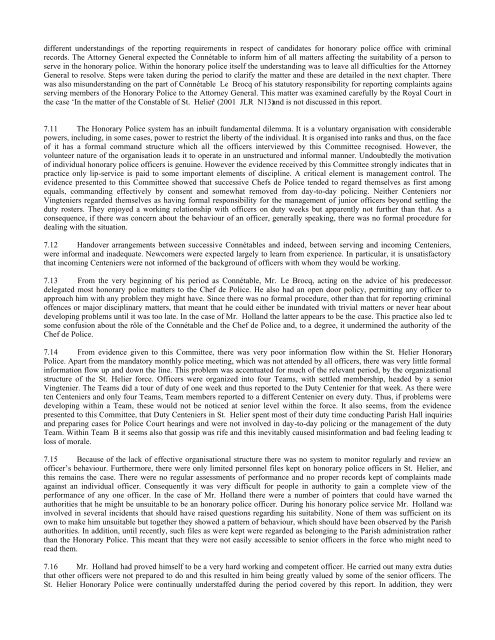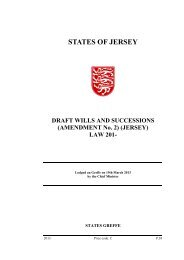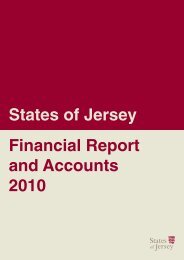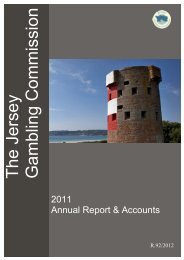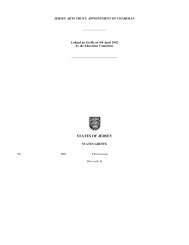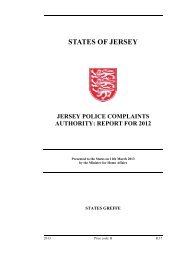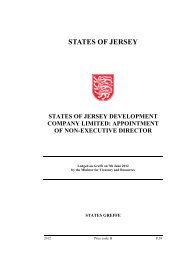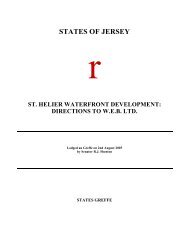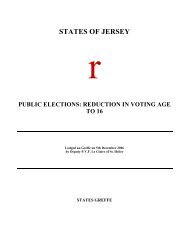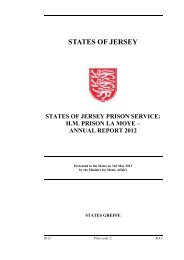report - States Assembly
report - States Assembly
report - States Assembly
- No tags were found...
Create successful ePaper yourself
Turn your PDF publications into a flip-book with our unique Google optimized e-Paper software.
different understandings of the <strong>report</strong>ing requirements in respect of candidates for honorary police office with criminalrecords. The Attorney General expected the Connétable to inform him of all matters affecting the suitability of a person toserve in the honorary police. Within the honorary police itself the understanding was to leave all difficulties for the AttorneyGeneral to resolve. Steps were taken during the period to clarify the matter and these are detailed in the next chapter. Therewas also misunderstanding on the part of Connétable Le Brocq of his statutory responsibility for <strong>report</strong>ing complaints againstserving members of the Honorary Police to the Attorney General. This matter was examined carefully by the Royal Court inthe case ‘In the matter of the Constable of St. Helier’ (2001 JLR N13)and is not discussed in this <strong>report</strong>.7.11 The Honorary Police system has an inbuilt fundamental dilemma. It is a voluntary organisation with considerablepowers, including, in some cases, power to restrict the liberty of the individual. It is organised into ranks and thus, on the faceof it has a formal command structure which all the officers interviewed by this Committee recognised. However, thevolunteer nature of the organisation leads it to operate in an unstructured and informal manner. Undoubtedly the motivationof individual honorary police officers is genuine. However the evidence received by this Committee strongly indicates that inpractice only lip-service is paid to some important elements of discipline. A critical element is management control. Theevidence presented to this Committee showed that successive Chefs de Police tended to regard themselves as first amongequals, commanding effectively by consent and somewhat removed from day-to-day policing. Neither Centeniers norVingteniers regarded themselves as having formal responsibility for the management of junior officers beyond settling theduty rosters. They enjoyed a working relationship with officers on duty weeks but apparently not further than that. As aconsequence, if there was concern about the behaviour of an officer, generally speaking, there was no formal procedure fordealing with the situation.7.12 Handover arrangements between successive Connétables and indeed, between serving and incoming Centeniers,were informal and inadequate. Newcomers were expected largely to learn from experience. In particular, it is unsatisfactorythat incoming Centeniers were not informed of the background of officers with whom they would be working.7.13 From the very beginning of his period as Connétable, Mr. Le Brocq, acting on the advice of his predecessor,delegated most honorary police matters to the Chef de Police. He also had an open door policy, permitting any officer toapproach him with any problem they might have. Since there was no formal procedure, other than that for <strong>report</strong>ing criminaloffences or major disciplinary matters, that meant that he could either be inundated with trivial matters or never hear aboutdeveloping problems until it was too late. In the case of Mr. Holland the latter appears to be the case. This practice also led tosome confusion about the rôle of the Connétable and the Chef de Police and, to a degree, it undermined the authority of theChef de Police.7.14 From evidence given to this Committee, there was very poor information flow within the St. Helier HonoraryPolice. Apart from the mandatory monthly police meeting, which was not attended by all officers, there was very little formalinformation flow up and down the line. This problem was accentuated for much of the relevant period, by the organizationalstructure of the St. Helier force. Officers were organized into four Teams, with settled membership, headed by a seniorVingtenier. The Teams did a tour of duty of one week and thus <strong>report</strong>ed to the Duty Centenier for that week. As there wereten Centeniers and only four Teams, Team members <strong>report</strong>ed to a different Centenier on every duty. Thus, if problems weredeveloping within a Team, these would not be noticed at senior level within the force. It also seems, from the evidencepresented to this Committee, that Duty Centeniers in St. Helier spent most of their duty time conducting Parish Hall inquiriesand preparing cases for Police Court hearings and were not involved in day-to-day policing or the management of the dutyTeam. Within Team B it seems also that gossip was rife and this inevitably caused misinformation and bad feeling leading toloss of morale.7.15 Because of the lack of effective organisational structure there was no system to monitor regularly and review anofficer’s behaviour. Furthermore, there were only limited personnel files kept on honorary police officers in St. Helier, andthis remains the case. There were no regular assessments of performance and no proper records kept of complaints madeagainst an individual officer. Consequently it was very difficult for people in authority to gain a complete view of theperformance of any one officer. In the case of Mr. Holland there were a number of pointers that could have warned theauthorities that he might be unsuitable to be an honorary police officer. During his honorary police service Mr. Holland wasinvolved in several incidents that should have raised questions regarding his suitability. None of them was sufficient on itsown to make him unsuitable but together they showed a pattern of behaviour, which should have been observed by the Parishauthorities. In addition, until recently, such files as were kept were regarded as belonging to the Parish administration ratherthan the Honorary Police. This meant that they were not easily accessible to senior officers in the force who might need toread them.7.16 Mr. Holland had proved himself to be a very hard working and competent officer. He carried out many extra dutiesthat other officers were not prepared to do and this resulted in him being greatly valued by some of the senior officers. TheSt. Helier Honorary Police were continually understaffed during the period covered by this <strong>report</strong>. In addition, they were


